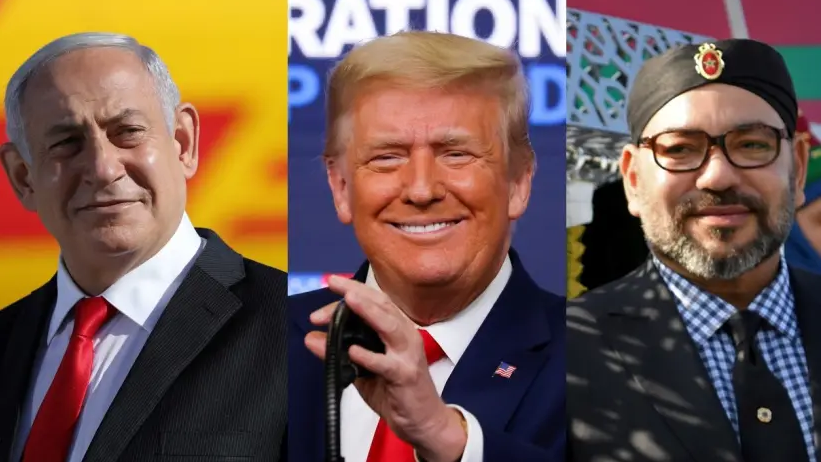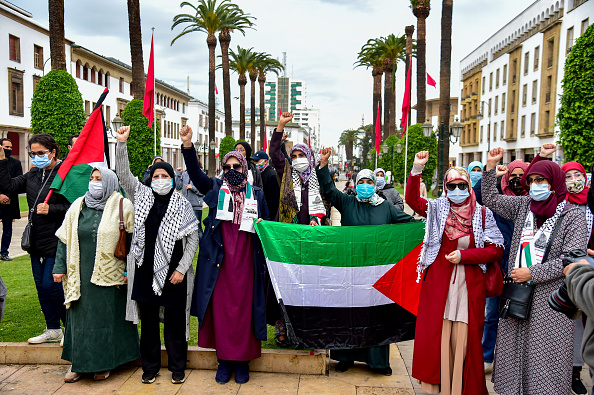
Israel PM Benjamin Netanyahu, U.S. President Donald Trump and Morocco King Mohammed VI. /Reuters
Israel PM Benjamin Netanyahu, U.S. President Donald Trump and Morocco King Mohammed VI. /Reuters
Editor's Note: Dr. Wang Jin is a research fellow at Charhar Institute in China and an associate professor at Northwest University in China. The article reflects the author's opinion, and not necessarily the views of CGTN.
Morocco and Israel have agreed to normalize ties with each other, making Morocco the fourth Arab state in 2020 to recognize and normalize ties with Israel. In the quid pro quo for Morocco's normalization efforts with Israel, Washington has proclaimed recognition of Morocco's sovereignty over the disputed Western Sahara.
The status of Western Sahara was the major bargaining chip for Donald Trump to encourage Morocco's normalization efforts with Israel. The local population has been struggling for independence since Spain withdrew four decades ago, and there is no nation that recognizes Morocco's sovereignty over Western Sahara except Washington's attitude towards Western Sahara surprised the United Nations which maintains that the territory's status should be determined by UN resolutions, not by Washington.
Morocco and Israel have kept low-profile ties for decades. Before modern Israel's establishment in 1948, Morocco was a major home of Jews in North Africa. Although hundreds of thousands of Morocco Jews moved to Israel after 1948, Moroccan Jews in Israel maintain their traditions and connections as well as linkages with Morocco. The African nation established unofficial ties with Israel after the 1990s through setting up diplomatic offices in Tel Aviv. The connection was suspended after the second Intifada (Palestinian Uprising) in 2000 but informal ties continued.
It seems that the normalization efforts between Israel and Morocco managed and facilitated by Trump benefit everyone involved in the negotiations. For the Trump administration, Washington hopes to mobilize more Arab states to recognize Israel under the Abraham Accords, which are perceived as Trump's major diplomatic legacy in the Middle East and aim to bring the Arab world and Israel together to establish permanent peace in the Middle East.
For Morocco, its claim over Western Sahara is respected and recognized by the U.S., marking an important diplomatic breakthrough. For Israel, the normalization with Morocco means a great diplomatic breakthrough that Morocco becomes the first Maghreb Arab state to recognize Israel.

Moroccans protest a normalization deal with Israel to mark the International Day of Solidarity with the Palestinian People in Rabat, Morocco, November 29, 2020. /Getty
Moroccans protest a normalization deal with Israel to mark the International Day of Solidarity with the Palestinian People in Rabat, Morocco, November 29, 2020. /Getty
However, normalization of Morocco-Israel ties might bring more challenges and uncertainties. On the one hand, Washington's attitude towards Western Sahara is a major blow to the Western Sahara local population fighting for independence, and also a challenge for ties between Morocco and other regional states. Western Sahara was occupied by Spanish colonists and the local people led by the Polisario Front continued their resistance since the 1970s.
After the withdrawal of Spain from Western Sahara, the Polisario Front's claim to gain independence in Western Sahara was supported by Algeria and Mauritania. Although Morocco launched a military offensive in 1991 to occupy large parts of Western Sahara, its territorial claim over Western Sahara has never been recognized by neighboring states and the UN.
With Washington's recognition of Morocco's claim over Western Sahara, the opposing views of Algeria, Mauritania and other neighboring states might be transformed into internal divisions inside the African Union and the Arab League, while military clashes between Morocco and the Polisario Front might erupt.
On the other hand, the Palestinians' feeling of being forgotten and isolated would become stronger. In 2002, Arab states expressed their willingness to establish ties with Israel based on the precondition of Israel-Palestine permanent peace.
Since September, four Arab states – the UAE, Bahrain, Sudan and Morocco – agreed to establish ties with Israel, while the precondition for such a step promised in the 2002 Arab Initiative is being deserted. For Palestinians, Israel's continuation of Jewish settlement construction in East Jerusalem and the West Bank squeezes Palestine's land for a future state, and violence against Israel might be adopted by Palestinians to show their anger and disappointment.
The normalization efforts between Morocco and Israel urged by Trump could be a major diplomatic victory, but it suggests more uncertainties and even challenges in both Maghreb and the Middle East.
(If you want to contribute and have specific expertise, please contact us at opinions@cgtn.com.)

